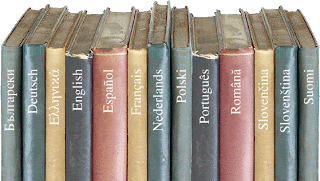There are some things you expect as an American in Europe. A diversity in languages is one of them.
Sort of.
When I moved to Holland I was re-assured repeatedly that "everyone speaks English there". What they really mean by that is that everyone speaks Dutch. And if you make it apparent that you don't - and the person is under the age of 35 - then you'll probably get some response in broken English.
This same principle can be said of Denmark and "everyone speaks English..." On one hand it's a bit frustrating when you realize that your sense of humor doesn't readily translate,you routinely eliminate colloquialisms and have to speak quite slowly to be better understood. But on the other hand, it's kind of magical. One moment you're in a totally foreign world where understanding nothing; and the next second you realize that you can carry a conversation with a new-found friend.
As much as I find it at times frustrating, isolating and at moments downright annoying... I'm really going to miss the language diversity when I go back to the states!
After 3 months in Denmark I've found a pretty wonderful circle of friends. Or, perhaps I should say "circles" of friends? I've also learned a lot of ways to read conversations by those things which are a universal means of expression - words aside.
Being in Europe I've been surrounded by a choir of languages.
Enter choral voices...
- My home-life is filled with giggling jabbbery kids. Who speak Danish! "Er du sulten?" Is one of the first things I learned to ask them - "are you hungry"? They eat about 17 times a day! And when the family sits down at dinner time I feel like I could be watching T.V. where all the characters are interacting in Danish and I have to pick out a word here and there and read their body language to deduct what's being said. Since the parents want to chat with the kids I'm left a bit on the side-lines and it's up to me to demystify what's going on right in front of me. But since life is looking after kids I've found it so easy with them: it's easy to play, laugh, tickle and make funny faces. Who needs words?
- Danish classes. I started studying this crazy language a couple of weeks ago - and in my classes I came into a circle of friends who are... German. They often speak to me in English but when the conversation is amongst themselves, they instantly transition back to Deutsch! And again, I'm surrounded by voices completely foreign to me, and rely on facial expressions, hand gestures to get the gist of the conversation. I've also discovered how useful verbal sound effects are when you can't think of the right word!
- Dancing friends... I met some awesome friends who are part of an international gymnastic school. I've been adopted into a circle of about 15 Latinos (from Argentina, Uruguay, Mexico, Costa Rica...) who love [love!]to dance. With this circle I fall back on my kindergarten-level Spanish. It doesn't do me much good that I studied it 9 years ago in high school - but fortunately dance is another universal language which does not require words!
When I was in Holland I got to meet a couple. He was Dutch but also knew German, Italian & English. She was Chilean, but used to live in Switzerland before moving to Holland. She had been studying Dutch for about 3 years, but they still spoke English at home. I remember being so baffled and wondering - "how can you sustain a relationship when his first language is Dutch, second English - and hers first is Spanish, second is German?" It just seems like such a huge gap. And we all know how difficult communication in a relationship can be even when you both speak the same language!
But now, after 5 months in Europe, I've come to realize that that is a very American perspective. I think we're just about the only culture which never expects to need a second (or third, or forth) language if we travel the world. In fact, it's easy to live in America your whole life and never learn another language. But this is completely different here in Europe. Danish people grow up studying English in school for most of their school age years, and they German for at least 3 years. Here, language is a currency of life.
And it's amazing.
